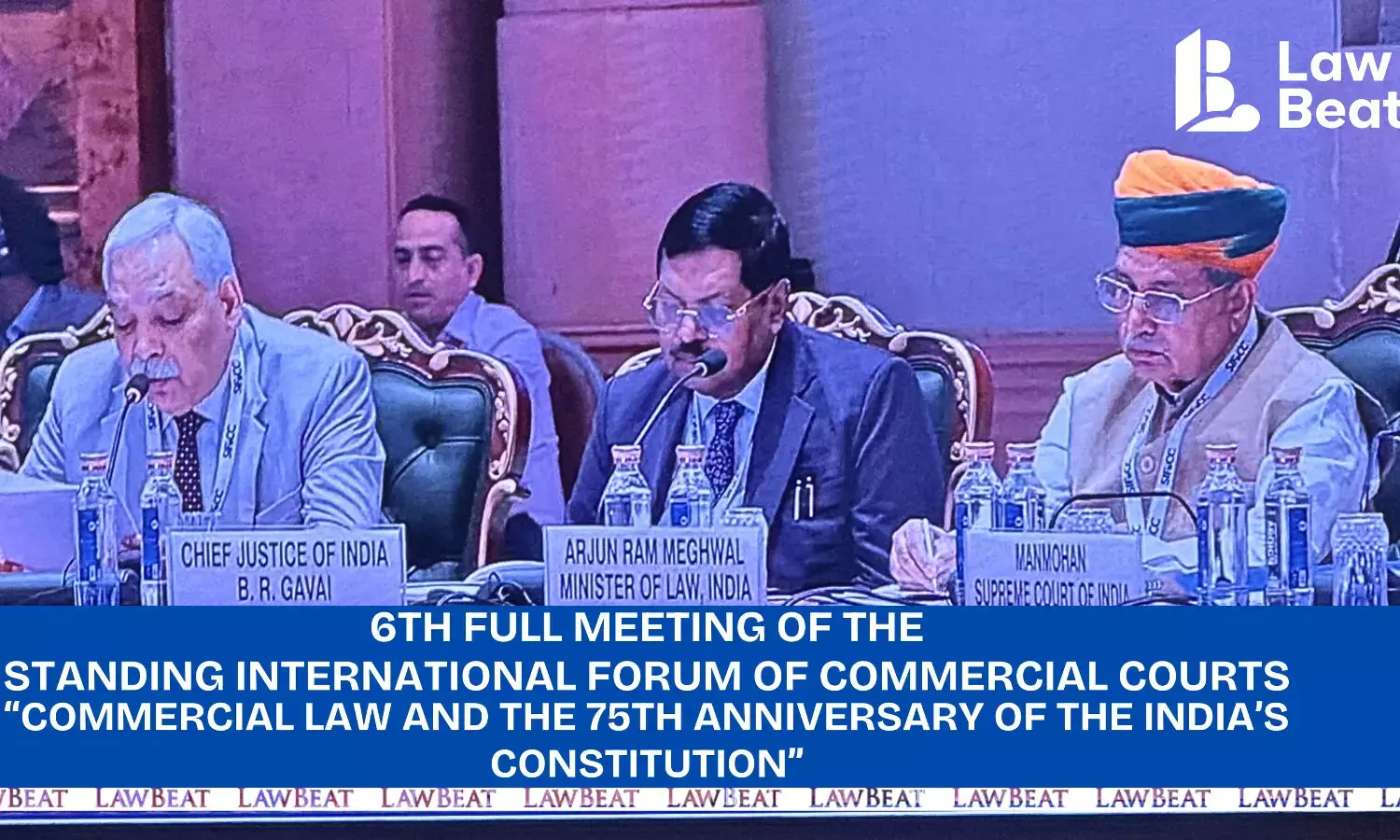CJI Gavai Highlights Constitutional Foundations of India’s Commercial Law at SIFoCC Meeting

CJI Gavai Explains How Constitutional Values Shape India’s Commercial Jurisprudence
Chief Justice B. R. Gavai addressed the Sixth Full Meeting of the Standing International Forum of Commercial Courts, presenting an expansive and historically grounded account of the evolution of India’s commercial law and its constitutional foundations.
Speaking before judges, chief justices and international delegates, he emphasised that India’s commercial jurisprudence has developed in alignment with the constitutional vision of fairness, transparency and opportunity. He opened his remarks by observing that the gathering represented a shared belief that the rule of law and the stability of commercial systems are essential to international cooperation.
He noted the significance of hosting this forum in India during the 75th anniversary of the Constitution, a document that, in his words, “has guided not only our democracy but also our evolving commercial jurisprudence.”
The Chief Justice traced the origins of India’s economic and commercial architecture to the Constituent Assembly’s deliberations. He stated that the framers were aware that political freedom would be incomplete without economic opportunity, fairness and growth. He described the Constitution as both visionary and pragmatic; Part III, which secures fundamental rights including the freedom to practise a profession or carry on trade or business under Article 19(1)(g), is balanced by Part IV, which directs the State to pursue social and economic justice. He also highlighted Article 14 as the guarantee against arbitrariness in State action and noted the central role of Part XIII in establishing India as “the world’s largest single democratic market.”
CJI Gavai explained that commercial law in India evolved in two broad phases, before and after 1991. In the first four decades after Independence, the economy followed a command and control approach with the State playing the central role in planning and regulation. The Companies Act, 1956 became the foundational statute of corporate governance, while the Monopolies and Restrictive Trade Practices Act, 1969 was enacted to prevent monopolistic conduct and ensure broad-based economic development. He emphasized that “law served as a tool for distributive justice” during this period.
The Chief Justice also referred to the transformative constitutional debate on land reforms that culminated in the Kesavananda Bharati judgment of 1973. By the late 1980s, however, the regulatory framework had become rigid and less responsive. He also described 1991 as the watershed moment that marked the transition to liberalisation, privatisation and globalisation.
Chief Justice Gavai also outlined several landmark enactments that reshaped the commercial legal landscape. The Securities and Exchange Board of India Act, 1992 marked a new phase of transparency and investor protection by establishing SEBI as an independent regulator, he said, adding further that The Arbitration and Conciliation Act, 1996, drawing from the UNCITRAL Model Law, “transformed the framework of dispute resolution in India,” strengthening India’s position as an arbitration-friendly jurisdiction. He highlighted the Competition Act, 2002 as a shift from controlling monopolies to promoting market efficiency and consumer welfare; The Micro, Small and Medium Enterprises Development Act, 2006 recognized MSMEs as engines of inclusive growth and provided mechanisms for prompt payment and accessible dispute resolution.
He noted the Companies Act, 2013 as a generational shift that aligned Indian corporate regulation with global standards, introduced corporate social responsibility and mandated the inclusion of at least one woman director for certain companies.
CJI Gavai identified the Commercial Courts Act, 2015 and the Insolvency and Bankruptcy Code, 2016 as further milestones that enhanced judicial efficiency, encouraged mediation and created time-bound systems for resolving financial distress.
Addressing the judiciary’s role, he said the Supreme Court has consistently acted as a guardian of the rule of law, intervening in economic policy matters only when fundamental rights or constitutional provisions are violated. He cited precedents including R. K. Garg, BALCO and Vodafone International to illustrate the Court’s approach to regulatory oversight, proportionality and commercial certainty.
He also referenced decisions such as Devas Multimedia and SBI v. Consortium of Murari Lal Jalan to highlight the Court’s stance against corporate misuse and its emphasis on timely resolution.
CJI Gavai then turned to emerging themes in commercial law, including fintech, artificial intelligence, blockchain and data governance. He noted that the Digital Personal Data Protection Act, 2023 and new fintech regulations are early steps in managing innovation responsibly. He said that questions of privacy, algorithmic transparency and consumer consent are becoming central to commercial regulation.
He added that sustainability, climate finance and ESG principles are likely to define the next phase of commercial development and that “profit must be aligned with purpose.”
He concluded by calling for continued strengthening of institutions, transparent regulators, independent tribunals and efficient courts; judiciary will remain a constitutional sentinel as India advances toward becoming a global economic leader, it was added.
Event: Sixth Full Meeting of the Standing International Forum of Commercial Courts
Speaker: Chief Justice B. R. Gavai
Date: 08.11.2025
